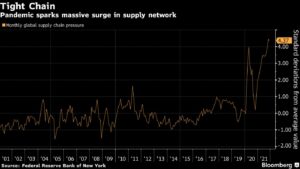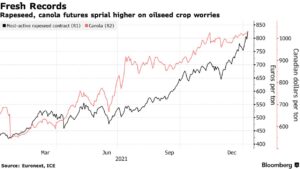A prolonged military conflict in the Middle East could potentially upend key commodity markets due to Iran’s control of the Strait of Hormuz, one of the world’s most important trade…
Omicron Disrupts Supermarket Supply Chains
Bloomberg writers Leslie Patton, Elizabeth Elkin, and Deena Shanker reported last week that, “The highly contagious omicron virus variant is disrupting already stressed food supply chains, sickening so many workers that more shortages at grocery stores are all but certain.
“Supermarkets have been struggling to keep food fully stocked throughout the pandemic as a result of labor shortfalls in every part of the food system, from farms to manufacturers to distributors. Now omicron is bringing the problem to a new level. The variant is raging across the U.S. and raising health concerns that many thought vaccines had put to rest. Schools and daycares are seeing closures again, keeping more Americans from work.
“All of that will help fuel wage increases and price surges for consumers, as well as 2020-style food outages.”

Last week’s article also pointed out that, “Meat companies are in focus because major outbreaks at plants in 2020 led to shortages and spikes in prices. Currently, beef and pork producers aren’t reporting significant operations issues, but there are signs of declining productivity. For instance, the number of hogs slaughtered so far this week was down 5.5% from a year ago, and cattle slaughter was down 3.6%, according to U.S. Department of Agriculture data Thursday.
National Daily #Hog and #Pork Summary, https://t.co/ETf5PTZZdT
— Farm Policy (@FarmPolicy) January 7, 2022
* Actual Hog Slaughter.
* 2021, 2020, and five-year average. pic.twitter.com/sg6SeyIwAG
“More food inspectors are calling in sick, too, said Paula Soldner, chair of the National Joint Council of Food Inspections Locals.”
Meanwhile, Wall Street Journal writer Jesse Newman reported in Friday’s paper that, “Conagra Brands Inc. expects Covid-19’s Omicron variant to stress food supply chains and stretch staffing at the maker of Birds Eye frozen vegetables and Slim Jim meat snacks.
The Chicago-based food manufacturer said more of its employees are testing positive for Covid at a time when heightened consumer demand is already outstripping the company’s available supplies.
The Journal article explained that, “JP Morgan analyst Ken Goldman said in a note this week that some food company executives have warned that a spike in Covid-19 could hurt their ability to supply products to customers in January. Executives’ concerns ranged from a shortage of trucks to worries about the deteriorating quality of raw materials arriving from suppliers.”
More broadly with respect to food prices, Bloomberg writer Megan Durisin reported on Friday that, “More bad weather for the world’s oilseed growers is pushing rapeseed and canola prices to fresh records and adding to food-inflation worries.
“Futures have been on a tear for a while, after last year’s harvests in Canada and Europe were plagued by scorching drought and planting cutbacks, cutting global rapeseed stockpiles to a four-year low. Now, worries are mounting about supplies of rival vegetable oils, with hot and dry weather hurting South American soybean prospects and flooding hitting palm oil farms in Malaysia.”

The Bloomberg article noted that, “As the recent crude oil rally also aids demand for the crops to make biodiesel, Paris rapeseed futures and North American canola notched new all-time highs on Friday. Their oils are also used for everything from frying French fries to mixing salad dressings. Rapeseed prices have nearly doubled in the past year.”





